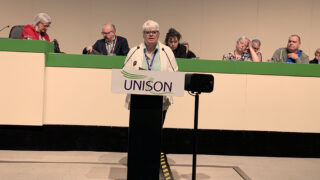Delegates at UNISON’s health conference took part in a wide-ranging debate on what is regarded as the under-funded and overworked “Cinderella” service of the NHS.
Conference heard of the continued pressure that funding cuts have created for staff working in mental health across the UK, with spiralling workloads, lack of support from management and the effects on their own mental health.
As a result, 45% of respondents to a UNISON survey have said they are thinking of leaving their jobs.
Sam Hemraj (above) of the health service group executive said that mental health care was a “critical service” for UK citizens that deserved better than the understaffing that funding forced upon it.
Her own son has personality disorder and has waited 18 months for treatment, she told delegates. “My son’s life is on hold. He is in desperate need to start treatment.
“It’s not just my son who’s waiting, but many other service users, which is putting strain on families and carers and frustrated staff.”
She said that “it’s the system that’s failed, not staff,” blaming the government for “lack of funding, lack of care, lack of understanding of users and staff.”
Roger Davey of Wiltshire and Avon said that there had been a cut in mental health beds of 30% since 2010, with an 8% cut in budgets.
“Tory policies are toxic to mental health and wellbeing,” he said. “Tory policies make people ill – then they take away the means to treat them. And that has a detrimental impact on the health of mental health workers.”
Susan Highton of Yorkshire & Humberside said: “There are no resources. They’ve been cut and cut and cut.” It wasn’t just nurses who are affected, she said, but admin staff, housekeepers, the whole gamut of support staff – many “burnt out, on their knees, crying, under stress.”
Pat Heron of the national women’s committee reminded conference that the NHS was predominantly comprised of female staff.
“Mental health services are broken and heading for crisis,” she added. “All we see is virtual money being moved from one service to another. There’s no new money. Nurses say it’s like being at war, on a battlefield, and you know you’re not winning.”
The day’s guest speaker was Andy Bell, deputy chief executive of the Centre for Mental Health, an independent charity which researches and collects evidence in support of equality for people with mental illness.
Mr Bell told the delegates that in recent years there had been no shortage of attention or interest on mental health. But this was not enough.
“It’s really important that we have a sensible debate about mental health legislation and modernise it so that it really reflects the 21st century and the values that I think we share,” he said, “with more shared decision-making, more rights and more equality for people with a mental illness.”
Conference called on the executive to:
- campaign for access to good mental wellbeing services for all NHS staff;
- promote the findings of the UNISON mental health survey and outline actions employers can take to ensure staff remain in their roles;
- continue to develop support for mental health champions and mental health first aiders within NHS organisations;
- campaign for improved resourcing of mental health services with a guaranteed percentage share of the NHS budget – allowing for sufficient funding and workforce numbers;
- campaign on a wider platform, including Labour Link, to secure political support for these objectives.
As Ms Highton told conference. “Let’s make mental health part of the NHS and not the Cinderella service.”




